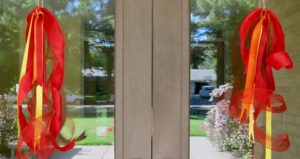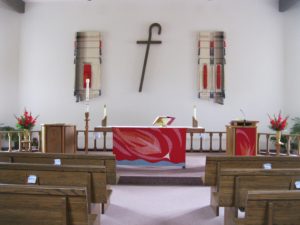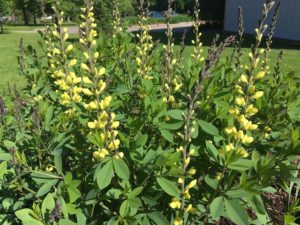A memorial service for Maxine Swiggum will be held at Good Shepherd on Friday, June 9, at 11:00 am. Pr. Amy Larson will officiate. A luncheon will be provided after the service. A full obituary may be found here.
This Week at Good Shepherd, June 5-11, 2017
Tuesday, June 6
11:30 a.m. – Education Committee
5:00 p.m. – Kids Lunch Club Packing
Thursday, June 8
10:00 a.m. – Bible Study
Friday, June 9
11:00 a.m. – Maxine Swiggum Memorial Service
Sunday, June 11– The Holy Trinity
9:30 a.m. – Worship with Holy Communion – Live Broadcast
10:30 a.m. – Fellowship Hour, Coffee Sale
Day of Pentecost – June 4, 2017
June 4, 9:30 a.m. – DAY OF PENTECOST – Worship with Holy Communion
From Pastor Amy … On Pentecost Sunday we celebrate the fire of the Spirit being poured out upon the church long ago and still today. The sanctuary will be decked out in red and we’re all invited to wear red to worship.
Our paraments and pastor’s stole, designed and woven by member Barbara Berg, the drape on the Shepherd’s Cross, altar candles, and flowers will be red, the liturgical color for festivals associated with the Holy Spirit. Other symbols and signs of the Holy Spirit and colors of flames will be evident at our entrances and Fellowship Hall, as well.
Sermon for Sunday, May 28, 2017 – “Prayer: A Doorway”
Sermon for Sunday, May 28, 2017 – “Prayer: A Doorway”
Seventh Sunday of Easter
May 28, 2017
Good Shepherd Lutheran Church
Decorah, Iowa
Rev. Amy Zalk Larson
Click here to read scripture passages for the day.
Beloved of God, grace to you and peace in the name of Jesus.
Before he was arrested and crucified, Jesus prayed for his disciples – those first ones and all of us who came after them. He prayed and he prayed and he prayed for a really long time. In fact, today we just heard the first part of this prayer that ends up being over 600 words long; that’s more like a short sermon than a prayer. And, Jesus offered this long prayer right after using more than 2100 words in his last sermon for his disciples. So, the next time worship goes long – I’m just saying – it could be worse.
In his final teachings and prayer, Jesus is unafraid of taking up space. He feels no need to apologize for talking for such a long time. As he takes up all this space, he reminds me of very talkative young children who are totally confident that others want to hear absolutely everything they have to say. It’s beautiful to see a child share in a totally unfiltered way, not afraid to take up space(especially if you’ve already had some quiet time and enough coffee).
Somewhere along the way, we start to wonder if we’re worthy of taking up so much space in the world. We filter, apologize and minimize our opinions or feel we should try to sound smarter and stronger and more powerful if we want our voice to be heard. We especially wonder if we’re worthy when it comes to prayer and to relationship with God.
Jesus simply prays a rather long-winded, repetitive prayer without apology. He trusts that he has a place in his Father’s attention, a place in his Father’s heart. He has that confidence of children who just start talking, who climb up into their parents’ lap with the knowledge that they are fully welcome in that space.
And in this prayer, Jesus prays that we would have that same intimacy and with God – that we would know that there is a place for us in God’s heart.
Throughout this Easter season we’ve talked a lot about how Jesus makes room for us, how he opens space for us in the presence of God. Yet we often struggle to experience that space, especially in prayer.
There are so many “shoulds”- things we feel we should do and should be that constrict us. We think our prayers should be carefully crafted, that we should believe them more, should know more, should have fewer doubts; or that we should do certain prayer practices and should have a carefully established prayer routine. We can feel so unworthy and inadequate in the presence of God. Besides all that, there are so many other things we feel we should be doing that keep us from praying. There is so much that gets in the way of feeling free to just take up space in the heart of God. Jesus knows all this and so he prays for us; he prays for you. Jesus claims space for you and draws you into a spacious, welcoming relationship with God. And, he shows that prayer isn’t another thing you have to do and do properly; it is simply claiming your space in God in any way you need at any given time. It is claiming your spot in the lap of God.
You can be long-winded and repetitive. You can be very angry or full of questions as we see in the Psalms.
You can just say help, thanks, or wow as Anne Lamott points out in her book with that title. You can simply call to mind the faces of people you care about and entrust them to God. You can pray with the news by just taking a deep breath and asking God to open space within you and within others to respond to the pain of the world with compassion and wisdom. We’re already saying, “oh my God” often as the news comes at us; just take a breath to open to God. Or you can just be quiet. You can just breathe or watch the river or look at the sky or listen to the birds. I’m guessing that’s how Jesus prayed often when he wasn’t wanting us to overhear him claim space in God for us.
Just listening, just paying attention to the mundane aspects of our lives in the presence of God who is also paying attention to them is prayer. Mary Oliver captures this in her poem entitled “Praying”:
It doesn’t have to be
the blue iris, it could be
weeds in a vacant lot, or a few
small stones; just
pay attention, then patch
a few words together and don’t try
to make them elaborate, this isn’t
a contest but the doorway
into thanks, and a silence in which another voice may speak.
And if you find it hard to enter the doorway into thanks and silence, you can trust that Jesus prays for you and provides that doorway for you. Jesus provides a door into a spacious relationship with God.
Jesus meets you today in his word, in his prayer, in his body and blood, and draws you into this spaciousness God longs for us to know. Jesus meets you and loves you and forgives you and sets you free from the “shoulds”, from the fears, doubts, scarcity, and judgements – from the things that make us, our lives feel constricted and anxious. He frees us and opens us to God and to one another, giving us space to welcome and care for others. He assures us that there is space for us in God. And he helps us to claim that space in prayer.
Let’s take a moment of silent prayer now.
This Week at Good Shepherd, May 29-June 4, 2017
Wednesday, May 31
7:30 a.m. – Men’s Breakfast
6:30 p.m. – Space Exploration Task Force
Thursday, June 1
10:00 a.m. – Bible Study
1:30 p.m. – Property and Management Committee
5:00 p.m. – Community Meal at First Lutheran
7:30 p.m. – Worship and Music Committee
Friday, June 2
12:00 p.m. – Stewardship Committee
Sunday, June 4 – Day of Pentecost
9:30 a.m. – Worship with Holy Communion
10:30 a.m. – Fellowship Hour






